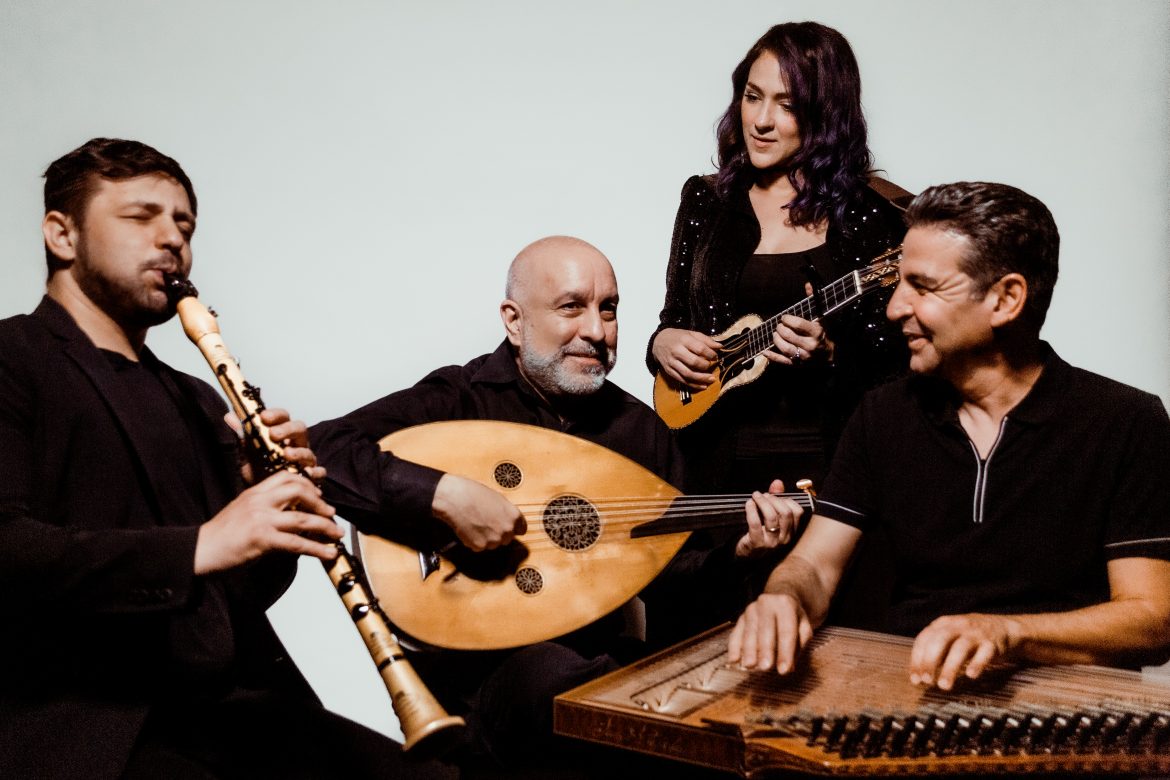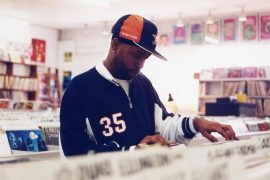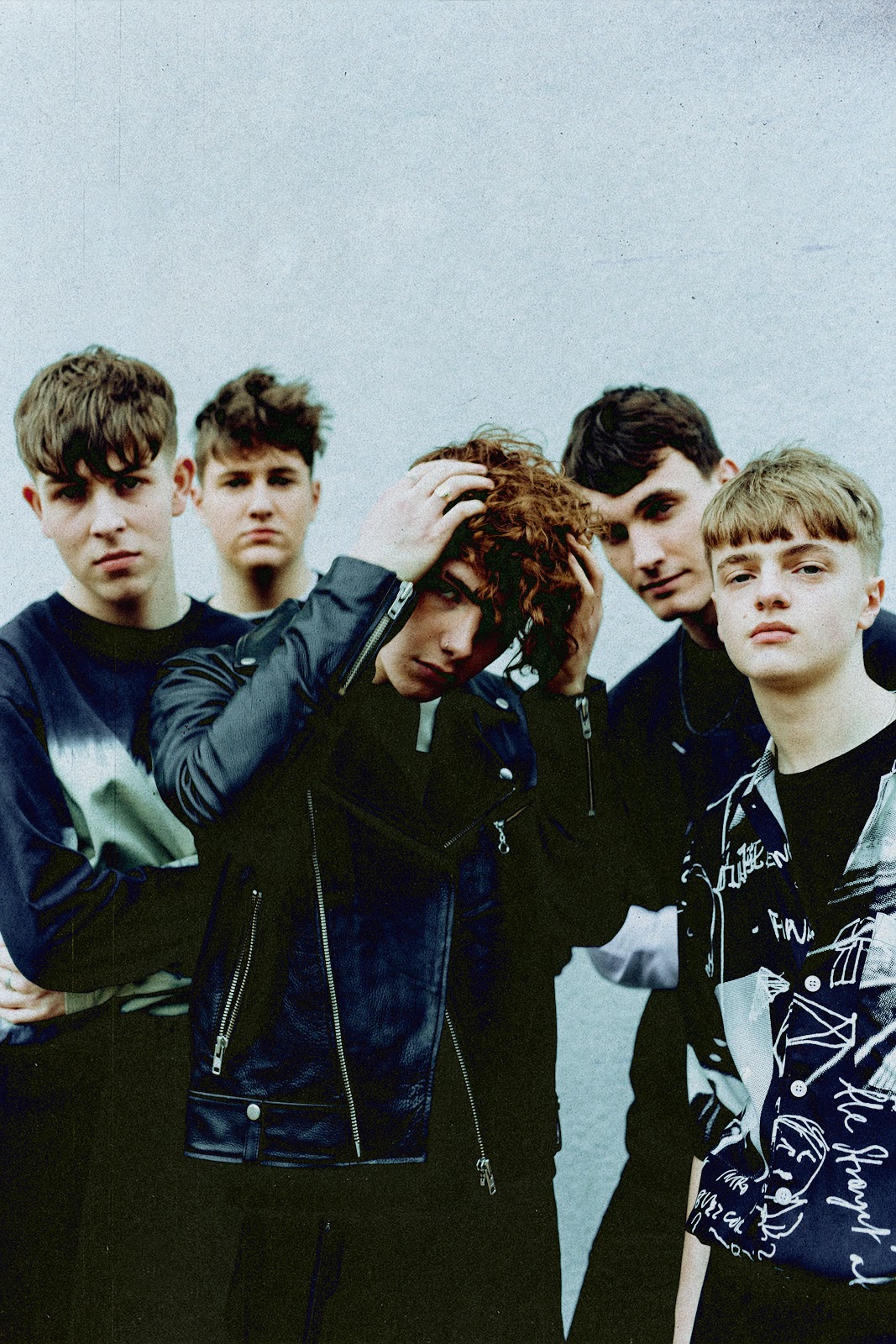On their self-titled record, Becca Stevens & The Secret Trio have combined tradition and modernity to craft a singular sound.
‘Becca Stevens & The Secret Trio’ – Becca Stevens & The Secret Trio
When Becca Stevens asked Michael League whose performance she absolutely couldn’t miss at groundUP Fest 2019, he told her, without hesitation, to see The Secret Trio. Stevens showed up to hear them play at 2 in the morning, exhausted from her own set earlier in the day; she had no idea that in mere moments, she would be laying the groundwork for her next project.

The resulting album is a glorious sprawl: a meeting place of tradition and modernity, contrapuntal melodies and beguiling harmonies. The Secret Trio, made up of oud player Ara Dinkjian, clarinetist Ismail Lumanovski, and qanun player Tamer Pinarbasi, combine the traditional sounds of their respective homelands (Armenia, Macedonia, Turkey) with contemporary sensibilities — but their work with Stevens proved to be a new expanse for them. The songs on Becca Stevens & The Secret Trio, written mostly by Stevens and Michael League, are made whole by the Trio’s deft arrangements, where they found “a new language” for their instruments.
The combination of Stevens’ ethereal voice and vivid lyricism with the Trio’s dynamic performance creates a soundscape that is both haunting and enchanting. From the blooming flower of album opener “Flow In My Tears” to the medieval lilt of its final track, “For You the Night Is Still,” the record feels almost clandestine. Its winding pathways seem to whisper secrets to the listener, pulling them closer to the album’s hypnotic locus.
For Stevens and the Trio, the record feels like fate — a strange synchronicity brought them together, pinning them at the center of “the music place,” as Dinkjian calls it. Despite having never met before, despite demos only being sent the night before the first rehearsal, everything was “effortless.” For him, music will find a way to reach anyone, no matter their dialect. “We can find a way to harmonize it,” he says. Becca Stevens & The Secret Trio is a perfect harmony, shot through with light and magic.
— —
:: stream/purchase Becca Stevens & The Secret Trio here ::
A CONVERSATION WITH BECCA STEVENS & THE SECRET TRIO

Atwood Magazine: How did this collaboration come to be?
Becca Stevens: I was at groundUP Fest in 2019. The festival is split into daytime shows on outdoor stages and then after hours shows in more moody rooms in the basement of a hotel. I had asked Mike League, “What show of the whole festival can I not miss?” Without missing a beat, he said, “The Secret Trio, it’s my favorite band in the whole world. If you miss it, you’ll regret it for the rest of your life.” And I said, “Okay, great. What time is it?” thinking he was gonna say like, 3pm. It was at 2am. I was like, “Oh, man, that’s the same day I perform, I don’t know,” and he said, “You asked me, I’m just telling you.”
So I stayed up that night to see the show that Mike had recommended so highly. The band started playing, and almost immediately, just involuntarily, tears started streaming down my face. I was like, “What am I listening to? Oh my God, this is incredible.” I had heard Turkish music, but I’d never heard anything like this before. I don’t have a very deep history of understanding Turkish music the way that Mike does, so even the traditional aspects of it were blowing me away. But obviously, these guys are doing stuff that’s on a whole other level. I was sitting next to [percussionist] Jamie Haddad. I’m crying, crying, and Jamie taps me on the shoulder between a couple songs, leans over and says, “This is your next band.”
I paused for a second and pictured it very clearly. But then I was like, there’s no way that they would do that with me, because they were on this throne right then in my mind. After the show, Jamie told Mike, and Mike went immediately backstage and told the trio. The trio, being how they are, were like, “Yeah, sure, we’d love to do that.” I was dumbfounded. It’s three in the morning and we’re making business plans. I think we talked about when specifically Mike would be available to produce it. That would have been February of 2019. In January of 2020, we were in the studio, making the record.
Ara Dinkjian: I could hear that story a hundred times. I just feel so good about it [laughs].
Had you guys heard Becca’s music before?
Ara Dinkjian: There’s no way to say this other than no.
Becca Stevens: I think I remember that Tamer knew. I’m not bragging [laughs], I just remember someone saying, “Oh, I love your stuff” in that moment and feeling like, “Oh, wow. Wow. Oh, thank you. Wow.” See, he’s got all the secrets of The Secret Trio.
A friend asked me today if you’re called The Secret Trio because you have secrets.
Tamer Pinarbasi: It’s because nobody knows us. [all laugh]

Becca, I know that hearing music at 2 in the morning can make everything more potent, so I'm wondering what specifically drew you to the trio's music?
Becca Stevens: Being exhausted magnifies either direction of your response. If you’re not captivated, it’s even harder to stay present and awake and interested through the whole performance. It could have gone the other way. And I know what you mean about those performances where you feel literally entranced. There’s that scene in West Side Story when the lovers see each other across the room, and everything around them just disappears. With the concerts that have really moved me, I’ve had that experience where I’m watching the show and I forget where I am. Everything outside of the performers just fades away.
If I had to put it into words — it almost feels like it cheapens the experience by putting it into words, but I’ll try. There are the intricacies of the arrangements, the way that it felt that each musician was pulling a totally different kind of weight. The approach to pitch also really spoke to me — the Middle Eastern, microtonal, as well as the traditional stuff.
There was a whole other layer beyond that, emotionally. You get the sense that they’re these three guys that love and respect each other and who have played a lot of music together, and they are creating this fabric that is just impenetrable — it’s perfect — but it’s still moving. There’s this sort of bittersweetness to everything. I don’t know if it’s the songs or the way they’re playing it, but everything feels like this mixture of bliss and sorrow.
It's music that doesn't sound one way. You can't pin down like, “This is a happy song.
Becca Stevens: I have an affinity for darkness in my music, and I also have an affinity for accompaniment being more contrapuntal, where each instrument has a role rather than serving as basic accompaniment. It hadn’t even occurred to me until Jamie said that thing to me that I write that way, where I give each of my bandmates lines instead of chords. I was thinking, “Man, if I did something with these guys, it would just bring a whole other element to my music.”
Ara Dinkjian: I want to make one comment about what Becca said regarding bliss and sorrow in the music. When she said that it occurred to me that each one of our respective cultural homelands, meaning Macedonia, Armenia, and Turkey, I think you could say in a general sense that the people there mourn deeply and they party deeply. There are these extremes of emotions and therefore their respective cultural musics reflect those things of true bliss and really deep, dark sorrow. It’s interesting that you said that, Becca, because that does indeed come through our histories.
That also reminds me of Jewish music, like Klezmer music or any Hasidic melody really, how it often sounds mournful even when it’s celebratory.
Ara Dinkjian: Absolutely, the same idea.

How did all of you approach the collaboration of writing and arranging these songs together? For the trio, what was it like bringing a fourth person into your world, and Becca, how did you approach this project differently from your solo work?
Becca Stevens: As far as the arranging is concerned, it was kind of magical how it came together. I don’t even really totally understand how it all came together because we sent these demos to them the night before the session.
Ara Dinkjian: I agree with [Becca] — after learning the parts that were composed and then just sitting down and playing, yeah: how did it all come together? It was pretty musical and effortless.
When you were writing and arranging, were there specific moods you were trying to achieve to match the story of a lyric to or was it the other way around?
Becca Stevens: I remember talking about the stories. We talked about “Maria,” and the story behind that song. I remember talking a little bit about the lyrics, but even that felt effortless. For three very stoic guys, their emotional switches are amazing, like the way that they can quickly plug into the emotional side of the music. I would mention something about the lyric and [what they did] was effortless. I almost felt like I didn’t need to [discuss anything], because they were listening to me. Even though my final vocals and guitars were tracked later, I was singing live with them in the studio, so they were reacting to me in real time.
And as you were arranging, were there things that stuck out to you about Becca’s lyrics that you were responding to? Or were you familiar with any of the poems she set?
Ara Dinkjian: I’ll speak for myself. I was not focusing on the lyrics, please forgive me, Becca. Personally, I was still a little bit anxious about finding my musical role in this new sonic texture, and wanting so much to serve the song, more than serve my fellow musicians or serve Becca or my goals. I wanted to find my role that would make the song succeed. I suppose I should have listened or paid more attention to the lyrics. But for me, it was a sonic thing.

I mean regardless, the sonic landscapes of these songs all fit so perfectly.
Becca Stevens: Some of them weren’t even done yet. Take “Lucien,” for example. I wrote the lyrics like nine months after you guys tracked the music. That was Tamer’s original song, and he told me that it was written for his grandson. I think you mentioned [the name] meaning light or sunlight. I had those little bits of information and then nine months later in September, when I was writing the lyrics, I had just found out that I was pregnant with a pregnancy that I lost a couple of months later. So the lyrics of “Lucien” ended up being about both his little grandson and also the baby that I was carrying. It’s all these things that are coming together at different times, and they worked because I was responding to what they played back in January. It’s a beautiful thing.
Becca Stevens: He’s sort of an unsung hero to some of my friend group. For people who love him, he’s like a god. People who know of him have been his fan for 20, maybe 30 years. I have a couple friends based in Durham, North Carolina, who first introduced me to his music maybe 20 years ago when I moved to New York. 10 years after that, someone on one of my tours started playing his music in the van and I was like, “This seems weirdly familiar. Why do I know this?” Then I realized the connection. “California” was the song that I fell in love with then. Similar to how I felt when I first heard The Secret Trio, I couldn’t really put into words why I love the song so much. It just moved me. It gives you that kind of nostalgic and bittersweet tug, but also joy. Ismail Lumanovski: I think this was a new territory for all of us, the trio I mean. Of course, we understand the sound and all that. There are some songs that were based on lines and things that Becca brought – they were things we understand, but they were exposed to us in a different way. So we had to find a new way of playing all of these lines that we were given. We had some of our compositions which we already knew how to feel and play, but for the new stuff, which is the majority of the project, we had to reinvent our way of playing and find a new language. I think that was a great thing for us, because now we have new ways to express ourselves. Ara Dinkjian: Yeah, it’s a new language, or certainly at the very least, a new dialect that we’re trying to speak. To work with somebody like Becca, we as individual musicians are expanding the roles of our instruments or the language of our instruments. Some of the things have never been done on these instruments, because it was never required, or it was never in that genre. The other thing that hasn’t happened yet, but we’re anticipating, is that just by being associated with her, we will be exposed to an audience that we otherwise would not have had the opportunity to reach. It’s sort of like how Ravi Shankar was already a legend in his country. But then when George Harrison takes a picture with him, suddenly, the rest of the world wants to know, “What is that instrument?” It didn’t make Ravi Shankar a better musician. It just expanded the knowledge of the rest of the world. So we’re very grateful for that too. And maybe in our own little way, we’ll show that new audience something that they don’t know. Becca Stevens: I feel like all of what Ara and Ismail said works both ways. This could be the way that people in a part of the world that I’ve never played before find out my name. And then musically, I have a tendency on my records to take on a lot in the studio with like, getting really obsessed with the production and getting really obsessed with the band leading and delegating what everyone is doing. That filters into my writing process as well. But for this project, I had a starting point because I was working with seeds that Mike initially sent to me. It wasn’t a blank canvas. Also, I knew that I was writing for someone else other than myself. I knew that I wasn’t the bandleader or carrying the bulk of figuring out what the accompaniment would be. It was such a liberating process. I got to just focus on my favorite stuff, which is melody and vocal harmonies. Getting to really put a lot of care and effort into the stories and the melodies and lyrics, and then the layers of vocal harmonies was like a songwriting spa week for me. The process didn’t feel tortured at all. Which, as we all know, songwriting can feel tortured. I’m already looking forward to the next one. Ara Dinkjian: Well, the mere fact that it worked is yet another example of how music is so uniting. It’s the meeting place where human beings, regardless of where they’re from, can see the same thing. This has been music’s role throughout history, and now with technology and travel, the world has gotten so small that it doesn’t matter what your dialect is. We can find a way to harmonize it. It’s about the human beings — this is working not because [Ismail] plays the clarinet well, or [Tamer] has a new way to play the qanun, or [Becca] has a beautiful voice. It’s because of the human beings that each one of them are — the ego is not part of the equation. It’s the human beings meeting at the music place. Becca Stevens: I love that. I think that our original intention for this record was not to blow the roof off of some kind of genre-bending new thing. It wasn’t like, let’s put these two things together and blow people’s minds. I think the original intention was creating music with people that I respected and was inspired by and with whom I have some sort of aligned vision. There was never a moment where I felt like they were looking at me like, “This chick is weird.” I mean, maybe behind my back a little bit from Ara [laughs], but it feels like a club of weirdos who all respect each other. Ara Dinkjian: That’s beautiful, Becca. [All laugh] Ismail Lumanovski: I wanted to say about the light bulb for me. It was getting brighter and brighter every moment of the work, but the full brightness was when I heard the final mix, actually. We hadn’t listened to it for months and months. We’d forgotten everything, it was so long after. When we heard it, I was like, “Who is that?” [laughs] That’s what I remember for myself. Becca Stevens: For me, if the dimmer gets brighter and brighter, it was the brightest the last time we played music together, which is a good sign. Ara Dinkjian: You mentioned the word fate. I don’t know if the guys thought about this, or you, Becca. But at that festival in 2019, Tamer and Ismail were there playing with their other group, the New York Gypsy All Stars. The Secret Trio was not supposed to play. But kind of at the last minute, they called me and said, “Could you fly down just for a day or two and do a set with us?” When you say fate, it wasn’t like this was a major gig that was planned; it was kind of like a last minute thing. So although I didn’t realize it, I have to say the magic moment was just being there, and then things started to happen. None of us were in control of it. I feel like we’re on a roller coaster, and we’re enjoying the ride. Things are a little less conscious and intentional. Maybe that’s where the sincerity of the project comes through. Like Becca said, we didn’t have this intention of, “Let’s do that thing.” No, we just like each other. We like to play music. Let’s play and then we’ll define it afterwards. — — — —
One of my favorite songs here is “California,” which is a cover of a Paul Curreri song. I hadn’t heard of him before this, and I know he’s faded into obscurity a bit in the past decade. What drew you to that song? Why, of all covers, this one?
I know the trio has done a lot of genre blending and expanding on the traditional sounds that you pull from, so when you were working on this record, did this seem like a natural progression to what you already do? Or was this new territory for you?

I'm so interested in music that stems from an older tradition and how it can expand like that. In response to that, Becca, what do you think you’ve gained from working with the trio?
Is there any kind of overarching narrative to this album or a sentiment that these songs all share?
The feeling I'm getting from all of you is that this record felt almost fated. Was there a certain point for each of you where you knew you had something really special happening? Was there a lightbulb moment?

Connect to Becca Stevens on
Facebook, Twitter, InstagramConnect to The Secret Trio on
Facebook, Twitter, InstagramDiscover new music on Atwood Magazine
? © David Goddard
:: Stream Becca Stevens ::
:: Stream The Secret Trio ::








